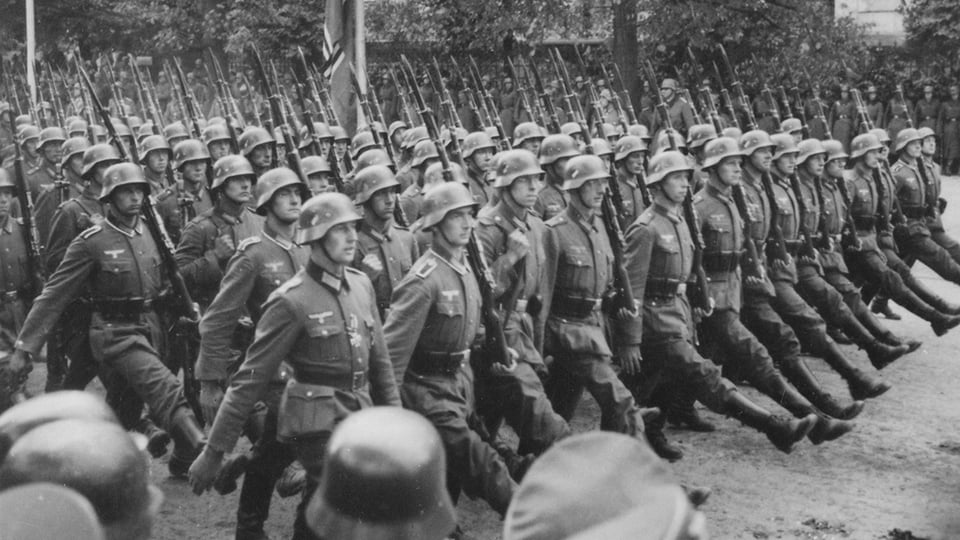World War II: Will It Happen Again?
Eighty years ago Germany invaded Poland. This began a six-year period of untold death and destruction we call World War II. Was this man’s last world war?

The German invasion of Poland on Sept. 1, 1939, resulted in France and the United Kingdom declaring war on Germany. After it invaded Poland, Germany continued to expand through force and quickly took control of most of continental Europe. France fell in the summer of 1940, which left Britain alone to defend itself against the Germans.
Throughout the summer of 1940, the Battle of Britain raged in the skies of London, only to be followed by the “Blitz,” the continuous German night bombing of London and other British cities until May of 1941.
The opposing military alliance, known as the Allied powers, included Great Britain, Poland (before the invasion), France (except during the occupation), the Soviet Union (June 1941), China and the United States (which entered the war on Dec. 8, 1941). Many other nations sided with the Allies as well, including India, Canada, Australia, New Zealand and South Africa.
The United States became the determining power in the alliance that led to victory in Western Europe and the Pacific. Germany surrendered on May 8, 1945, 3½ years after the U.S. entered the war.
When all was said and done, World War II grew to a conflict that encompassed at least 30 nations. Before it ended, at least 60 million human lives were lost.
The greatest number of civilian casualties were in the massacres that took place in China and Russia, 20 million and 24 million respectively. World War II also saw the attempted genocide of a whole race of people. The Holocaust resulted in over 6 million Jews being exterminated in the German death camps.
This war’s death toll was four times greater than the world war that preceded it. World War I resulted in 15 million deaths (a staggering number by itself). When both wars were history, they set the record for the worst two wars, measured by human casualties, in human history.
After they were over, many organizations were put into place to try to prevent a war of this scale from ever happening again. But does the Bible reveal an even greater world war will occur in the future?
What came out of World War II?
In August of 1945, following Germany’s surrender in May, the United States dropped two atomic bombs on the Japanese cities of Hiroshima and Nagasaki. The result was the unconditional surrender of Japan and the official end of World War II. But while it did end the war, it also began a new age—the nuclear age. Ironically, what ended the world’s most destructive conflict was a technology that had the potential to destroy on an unimaginably massive scale.
Ironically, what ended the world’s most destructive conflict was a technology that had the potential to destroy on an unimaginably massive scale.
In fact, the advent of the nuclear age made the fulfillment of one of Jesus’ prophecies possible for the first time in human history: “And unless those days were shortened, no flesh would be saved; but for the elect’s sake those days will be shortened” (Matthew 24:22).
This prophecy is describing the potential to destroy all human life. Though World War II was the deadliest war in human history, there were many parts of the globe, and millions of people, who were unaffected by it. But now weapons of mass destruction—including nuclear weapons that are far more destructive than the two dropped on Japan in 1945—have the potential to destroy all human life.
Will there be a future world war?
At the end of the first century, a detailed prophetic revelation was given to the last of the 12 apostles, the apostle John. We know this prophecy as the book of Revelation. In the middle of the book, John described the horrific destruction of human life during an end-time world war.
John wrote, “And thus I saw the horses in the vision: those who sat on them had breastplates of fiery red, hyacinth blue, and sulfur yellow; and the heads of the horses were like the heads of lions; and out of their mouths came fire, smoke, and brimstone. By these three plagues a third of mankind was killed—by the fire and the smoke and the brimstone which came out of their mouths” (Revelation 9:17-18).
The world population in mid-2019 was over 7.5 billion human beings. If this prophesied war were to happen today, over 2.5 billion, a “third of mankind,” would die. That would be 2.4 billion more deaths than in World War II.
As Jesus said, “For then there will be great tribulation [which will include worldwide warfare], such as has not been since the beginning of the world until this time, no, nor ever shall be” (Matthew 24:21).
How war will be stopped
But the good news is that God will not let mankind destroy itself. He will stop the conflict right before it gets to that point. Jesus Christ will return and forcibly end the conflict that may well be described as World War III. He will have to do that by fighting those who are destroying this earth through warfare (Zechariah 14:3-4), but after they are taken care of, He will establish a new era of peace where “nation shall not lift up sword against nation, neither shall they learn war anymore” (Isaiah 2:4).
As we consider the 80th anniversary of history’s most destructive conflict, we should not only remember those who lost their lives in it, but also consider the encouraging truth that human warfare will come to an end at the return of Jesus Christ.
Date Posted: August 29, 2019



